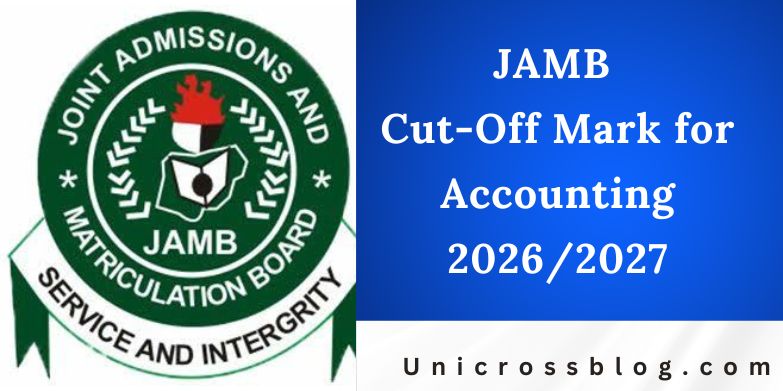The Joint Admissions and Matriculation Board (JAMB) plays a crucial role in the Nigerian higher education system by conducting the Unified Tertiary Matriculation Examination (UTME) and setting benchmark cut-off marks for admissions. For aspiring students interested in Accounting, understanding the JAMB cut-off mark is essential. This mark serves as the minimum score required in the UTME to qualify for admission into Accounting programs across Nigerian universities, polytechnics, and colleges of education.
Accounting is a highly sought-after course that equips students with skills in financial management, auditing, taxation, and business analysis. It opens doors to careers in banking, consulting, corporate finance, and entrepreneurship. With the growing demand for financial experts in Nigeria’s evolving economy, competition for spots in Accounting departments is intense. The cut-off mark for Accounting typically exceeds the general JAMB benchmark due to this popularity.
As of the 2025/2026 session, JAMB has set the minimum cut-off at 150 for universities, but institutions often raise it higher for competitive courses like Accounting. For the upcoming 2026/2027 session, projections suggest a similar or slightly adjusted benchmark, influenced by factors such as candidate performance, enrollment quotas, and policy decisions from the annual JAMB policy meeting. While official figures for 2026/2027 will be announced closer to the UTME registration period, historical trends indicate stability around 150 to 200 marks for Accounting. This guide provides detailed insights, including institutional variations, preparation tips, and frequently asked questions to help you navigate the process effectively.

Understanding JAMB Cut-Off Marks
JAMB cut-off marks represent the baseline scores that determine eligibility for post-UTME screenings and subsequent admissions. The national minimum is decided annually during the JAMB policy meeting, involving stakeholders like vice-chancellors and rectors. For universities, this minimum was 150 in the 2025/2026 session, with polytechnics and colleges of education at 100.
However, cut-off marks for specific courses like Accounting are set by individual institutions based on demand. Accounting, being a professional program under faculties of management sciences, often requires scores 20 to 50 points above the general threshold. This ensures only the most qualified candidates proceed. The process involves aggregating UTME scores with post-UTME results and O’Level grades to compute a final admission score.
For 2026/2027, expect the national minimum to hover around 150 for universities, as JAMB aims to balance access and quality amid rising applicant numbers. Institutional cut-offs for Accounting are projected to range from 160 to 250, with top federal universities demanding the higher end. Achieving a score above the cut-off significantly boosts your chances, but excelling in post-UTME is equally vital.
General Cut-Off Mark for Accounting
The general JAMB cut-off for Accounting aligns with university benchmarks but varies by institution type. For federal universities, it starts at 180 to 200, reflecting high competition. State universities may accept 160 to 180, while private ones offer flexibility from 140 to 160, though reputable privates like Covenant University maintain 180.
Polytechnics set lower bars, often 100 to 120 for National Diploma (ND) in Accounting, making them accessible alternatives. Colleges of education require around 100 to 140 for Nigeria Certificate in Education (NCE) programs combining Accounting with education.
Projections for 2026/2027 anticipate no major shifts unless UTME performance dips significantly. Aim for at least 200 in UTME to target elite programs, as this positions you favorably for merit lists.
Institutional Cut-Off Marks for Accounting
Each university determines its Accounting cut-off based on capacity and applicant pool. Below is a table summarizing projected cut-off marks for select institutions for the 2026/2027 session, based on 2025/2026 trends. These are estimates; always verify during registration.
| Institution | Type | Projected Cut-Off Mark for Accounting |
|---|---|---|
| University of Lagos (UNILAG) | Federal | 200 – 220 |
| University of Ibadan (UI) | Federal | 200 – 220 |
| Ahmadu Bello University (ABU) | Federal | 180 – 200 |
| University of Nigeria (UNN) | Federal | 180 – 200 |
| University of Abuja (UNIABUJA) | Federal | 180 |
| Obafemi Awolowo University (OAU) | Federal | 200 |
| University of Benin (UNIBEN) | Federal | 200 |
| Lagos State University (LASU) | State | 160 – 180 |
| Delta State University (DELSU) | State | 160 |
| Ekiti State University (EKSU) | State | 160 |
| Covenant University | Private | 180 |
| Babcock University | Private | 160 – 180 |
| Benson Idahosa University | Private | 180 |
| Federal Polytechnic Nekede | Poly | 100 – 120 |
| Yaba College of Technology | Poly | 100 – 120 |
This table highlights variations: federal institutions dominate the higher end due to prestige and limited slots. State and private options provide more entry points for moderate scorers.
O’Level and UTME Subject Requirements
Beyond cut-off marks, eligibility demands specific qualifications. For O’Level, candidates need at least five credits in SSCE (WAEC, NECO, or GCE), including English Language, Mathematics, Economics, and any two from Accounting, Commerce, Government, or Business Methods. Credits must be obtained in no more than two sittings.
UTME subjects for Accounting are English Language (compulsory), Mathematics, Economics, and one of Accounting, Commerce, Government, or Geography. Direct Entry applicants require ND/ND upper credit, HND, or A’Level passes in relevant subjects.
For 2026/2027, these requirements remain standard, emphasizing quantitative aptitude. Strong O’Level results can offset a borderline UTME score during aggregation.
Preparation Tips for Meeting the Cut-Off
Success in JAMB starts with strategic preparation. Begin by familiarizing yourself with the syllabus, focusing on Mathematics and Economics, which carry high weightage for Accounting. Use past questions to practice time management; aim for 250+ in mocks to buffer against exam-day nerves.
Enroll in reputable coaching centers or online platforms for structured learning. Daily study routines, covering two subjects per session, build retention. Health matters: sleep well, eat balanced meals, and exercise to maintain focus.
Post-UTME preparation is key. Many universities test similar subjects; revise UTME notes immediately after. Track admission guidelines via JAMB’s CAPS portal for updates. Change of course/institution if needed, but only if your score aligns with alternatives.
For 2026/2027, leverage digital tools like JAMB’s CBT simulations. Parental support and peer study groups enhance motivation. Remember, consistency trumps cramming; start early for optimal results.
Career Prospects in Accounting
Studying Accounting leads to diverse opportunities. Graduates can become chartered accountants (ICAN/ACCA certified), auditors, tax consultants, or financial analysts. Roles in banks, multinationals, and government agencies offer competitive salaries, starting at N150,000 monthly for entry-level.
Advanced studies open forensic accounting or MBA paths. In Nigeria’s fintech boom, skills in blockchain auditing are emerging. Professional bodies like ICAN provide networking and certification to boost employability.
The field promises stability amid economic shifts, with demand projected to rise 10% by 2030 per labor reports.
READ ALSO: JAMB Cut-Off Mark for Computer Engineering 2026/2027
FAQs
What is the minimum JAMB score for Accounting in 2026/2027?
The national minimum for universities is projected at 150, but Accounting typically requires 160 to 200 depending on the institution.
Can I study Accounting with 150 in JAMB?
Yes, in some state or private universities, but federal ones demand higher. Check specific cut-offs.
Is post-UTME compulsory for Accounting?
Most universities conduct it; prepare as it influences final admission scores.
What if I score below the cut-off?
Consider polytechnics (100+), change course, or rewrite next year. Supplementary admissions may offer chances.
Are there scholarships for Accounting students?
Yes, via ICAN foundations or federal grants; maintain high GPAs for eligibility.
How does JAMB aggregate scores for Accounting?
50% UTME, 30% post-UTME, 20% O’Level; varies slightly by school.
Can direct entry candidates bypass UTME cut-offs?
Yes, with qualifications like ND/HND, but merit lists apply.







